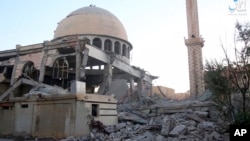ອົງການອົບພະຍົບສະຫະປະຊາຊາດ ຫຼື UNHCR ລາຍງານເຖິງການຕໍ່ສູ້ທີ່ໂຫດຫ້ຽມ
ໃນເມືອງ Raqqa ທາງພາກເໜືອຂອງຊີເຣຍ ເຮັດໃຫ້ບໍ່ສາມາດສົ່ງຄວາມຊ່ອຍເຫຼືອ
ທີ່ຈຳເປັນທີ່ສຸດ ໄປເຖິງພວກຜູ້ຄົນຈຳນວນຫຼາຍເປັນພັນໆ ທີ່ກຳລັງຫລົບໜີອອກຈາກ
ສະໜາມລົບຢຢຢູ່. ອົງການ UNHCR ພວມຂໍຮ້ອງ ໄປຍັງທຸກພັກຝ່າຍທີ່ສູ້ຮົບກັນ ໃຫ້ເປີດຊ່ອງທາງ ເພື່ອໃຫ້ຄວາມຊ່ອຍເຫຼືອໄດ້ເຂົ້າໄປເຖິງຫຼາຍຂຶ້ນ. Lisa Schlein
ນັກຂ່າວຂອງ VOA ສົ່ງລາຍງານ ມາຈາກ ນະຄອນ Geneva ສູນກາງຂອງ UNHCR
ຊຶ່ງວັນນະສອນ ຈະນຳລາຍລະອຽດມາສະເໜີທ່ານ.
ການຕໍ່ສູ້ເພື່ອຍຶດຄືນ ເມືອງ Raqqa ເມືອງຫຼວງທີ່ຕັ້ງຂຶ້ນມາເອງຂອງກຸ່ມລັດອິສລາມ
ພວມລຸກເປັນໄຟ. ການປະຕິບັດງານທາງທະຫານ ທີ່ໜູນຫຼັງໂດຍສະຫະລັດ ຄາດວ່າ
ຈະຍືດເຍື້ອຍາວນານ ແລະມີການນອງເລືອດ.
ອົງການສະຫະປະຊາຊາດ ບໍ່ສາມາດຈະເຂົ້າເຖິງ ພົນລະເຮືອນ 430 ພັນຄົນ ດ້ວຍການ
ຊ່ອຍເຫຼືອດ້ານມະນຸດສະທຳ ໃນຂົງເຂດທີ່ຖືກປິດລ້ອມ ນັບຕັ້ງແຕ່ປີ 2014 ເປັນຕົ້ນ
ມາ. ແລະພວກເຂົາເຈົ້າກ່າວວ່າ ການຖະລົ່ມທາງທະຫານ ກໍເບິ່ງຄືວ່າ ຈະເຮັດໃຫ້ການ
ເຂົ້າໄປເຖິງຍາກລຳບາກຂຶ້ນກວ່າເກົ່າ.
ອົງການອົບພະຍົບ UNHCR ລາຍງານວ່າ ຈຳນວນຜູ້ຄົນ ທີ່ຫລົບໜີຈາກການຕໍ່ສູ້
ກັນນີ້ແມ່ນນັບມື້ນັບເພີ່ມຂຶ້ນ. ທ່ານ Andre Mahecic ໂຄສົກຂອງອົງການ
UNHCR ກ່າວວ່າ ໃນເດືອນພຶດສະພາ ມີຫຼາຍກວ່າ 100 ພັນຄົນ ບໍ່ມີທີ່ຢູ່ອາໄສ.
ທ່ານກ່າວວ່າ ອົງການຂອງທ່ານ ພວມເຮັດວຽກຢ່າງໃກ້ຊິດ ກັບອົງການອື່ນໆ
ເພື່ອນຳການຊ່ອຍເຫຼືອໄປໃຫ້ພວກຂາດທີ່ຢູ່ອາໄສ.
ທ່ານ Mahecic ກ່າວວ່າ “ແຕ່ວ່າ ດ້ວຍຄວາມຈຳເປັນເພີ່ມຂຶ້ນ ແລະການຂາດທີ່ຢູ່
ອາໄສຖີບຕົວສູງຂຶ້ນ ການເຂົ້າເຖິງສະຖານທີ່ທາງພາກພື້ນດິນຈຶ່ງເປັນການທ້າທາຍ.
ເຄື່ອງບັນເທົາທຸກບາງຢ່າງ ແມ່ນຖືກນຳສົ່ງທາງອາກາດ ຈາກນະຄອນ Damascus
ສູ່ເມືອງ Qamishli. ມັນເປັນການລຳລຽງທີ່ສິ້ນເປືອງແລະລຳບາກ. ຈົນເທົ່າເຖິງ
ປັດຈຸບັນນີ້, ຍັງບໍ່ທັນມີການເຂົ້າເຖິງທາງພາກພື້ນດິນເທື່ອ ທີ່ຈະລຳລຽງ ເຄື່ອງບັນເທົາທຸກທັງຫຼາຍ. ຮ່ວມກັບຄູ່ພາຄີ ພວກເຮົາສືບຕໍ່ຂົນຂວາຍຫາເສັ້ນທາງ ທີ່ເປັນໄປໄດ້
ແລະປະສານງານກັບເຈົ້າໜ້າທີ່ທ້ອງຖິ່ນ ເພື່ອຄ້ຳປະກັນຄວາມປອດໄພ ໃຫ້ເຂົ້າຮອດ
ເຂົ້າເຖິງພວກທີ່ມີຄວາມຈຳເປັນ ເປັນທີ່ສຸດນັ້ນ.”
ທ່ານ Mahecic ກ່າວວ່າ ພວກຜູ້ຄົນ ທີ່ຫລົບໜີຈາກການຕໍ່ສູ້ກັນນັ້ນ ແມ່ນໄດ້ໄປ
ອາໄສຢູ່ໃນສະຖານທີ່ຫລົບໄພຊົ່ວຄາວໃນຫຼາຍໆຂົງເຂດ. ທ່ານກ່າວວ່າ ເປັນການ
ຫຍຸ້ງຍາກທີ່ຈະຫາໂຕພວກເຂົາເຈົ້າໄດ້ ເພາະວ່າຫຼາຍໆຄົນ ຍົກຍ້າຍໄປຍັງສະຖານທີ່
ອື່ນໆເປັນປະຈຳ. ທ່ານກ່າວວ່າ ພວກເພິ່ນສາມາດໃຫ້ການຊ່ອຍເຫຼືອໄດ້ ແກ່ 1 ພັນ
700 ຄົນ ໃນສູນ Mabrouka ທີ່ເມືອງ Hassakeh.
ແຕ່ ທ່ານຍັງໃຫ້ຂໍ້ສັງເກດວ່າ ການປະຕິບັດງານທາງດ້ານມະນຸດສະທຳທີ່ດີທີ່ສຸດ
ກໍແມ່ນເປັນແບບໄດ້ແດ່ບໍ່ໄດ້ແດ່. ທ່ານກ່າວວ່າ ສະພາບການຂອງສູນຕ່າງໆ,
ເປັນການຫຍຸ້ງຍາກລຳບາກ ແລະພວກຜູ້ຄົນທີ່ເຂົ້າມາກໍແມ່ນມີສູງຫຼາຍ. ທ່ານກ່າວ
ອີກວ່າ ຍິ່ງໄປກວ່ານັ້ນ, ຄວາມພະຍາຍາມ ທີ່ຈະໃຫ້ການຊ່ອຍເຫຼືອ ໃນຂົງເຂດ
ທີ່ຫຼໍ່ແຫຼມນີ້ ແມ່ນເປັນອັນຕະລາຍຫຼາຍ.
ທ່ານ Mahecic ກ່າວວ່າ “ອົງການເພື່ີອມະນຸດສະທຳ ແມ່ນເຮັດວຽກເພື່ອຈະຫາ
ຊ່ອງທາງທີ່ມີປະສິດທິຜົນສູງສຸດ ໃຫ້ເຂົ້າຮອດເຂົ້າເຖິງພວກທີ່ມີຄວາມຈຳເປັນ
ສຳລັບເຄື່ອງບັນເທົາທຸກພວກນີ້ ໃນຂົງເຂດສູ້ລົບ ໃນເຂດທີ່ລະເບີດຝັງດິນ
ທີ່ຍັງບໍ່ທັນແຕກ ຊຶ່ງຖືເປັນເລື່ອງທຳມະດາ ປົກກະຕິແລ້ວນັ້ນ. ແລະທ່າມກາງ
ລາຍງານທີ່ເຊື່ອຖືໄດ້ ກ່ຽວກັບການເສຍຊີວິດ, ພວກເຮົາ ໄດ້ຢ້ຳເຕືອນທຸກ
ພັກຝ່າຍ ເຖິງໜ້າທີ່ຂອງພວກເຂົາເຈົ້າ ທີ່ຈະປະຕິບັດຕາມກົດລະບຽບການ
ຂອງກົດໝາຍມະນຸດສະທຳນາໆຊາດ ພົນລະເຮືອນຕ້ອງໄດ້ຮັບການຄຸ້ມກັນ
ແລະຈະບໍ່ເປັນເປົ້າໝາຍຂອງການໂຈມຕີໃດໆ.”
ໃນຂະນະດຽວກັນນັ້ນ ທ່ານ Mahecic ຍັງກ່າວວ່າ ອົງການ UNHCR ແລະອົງການ
ພາຄີອື່ນໆ ຈະປະຕິບັດຈົນສຸດຄວາມສາມາດຂອງພວກເຂົາເຈົ້າ ເພື່ອໃຫ້ຄວາມ
ຊ່ອຍເຫຼືອໄປຮອດໄປເຖິງ ແລະການຮັກສາຄວາມປອດໄພ ແມ່ນໄດ້ຮັບການຄໍ້າ
ປະກັນ. ທ່ານຍັງ
ກ່າວວ່າ ເຄື່ອງບັນເທົາທຸກສຳຫຼັບ 50 ພັນຄົນ ແມ່ນມີພ້ອມ ສູນອົບພະຍົບແມ່ນ
ໄດ້ຂະຫຍາຍອອກ ແລະຕູບຜ້າຕັ້ງແລະອຸບປະກອນສຸກເສີນອື່ນໆ ແມ່ນໄດ້ຖືກ
ຂົນຍ້າຍເຂົ້າສູ່ຄ້າຍດັ່ງກ່າວ.
The U.N. refugee agency reports fierce fighting in the embattled
city of Raqqa in northern Syria is preventing desperately needed
aid from reaching thousands of people fleeing the battle.
The UNHCR is appealing to the warring parties for greater
access. Lisa Schlein reports for VOA from UNHCR head-
quarters in Geneva.
The battle to retake Raqqa, the de-facto capital of Islamic State is heating up. The military operation, backed by the United States is expected to be long and bloody.
U.N. agencies have been unable to reach some 430,000 civilians with humanitarian aid in this besieged area since 2014. And, they say the military offensive is likely to make access to them even more difficult.
The U.N. refugee agency reports the number of people fleeing the conflict is growing. UNHCR spokesman Andre Mahecic says in May more than 100,000 people were displaced. He says his agency is working closely with others to try to bring aid to the displaced.
"But with needs growing and displacement rising, access on the ground is challenging. Relief items are being airlifted from Damascus to Qamishli. It is a costly and complex undertaking. Until now, there were no viable land routes available to move supplies. With partners we continue to explore all possible supply routes and are working with the authorities to secure greater access to those in need."
Mahecic says people fleeing the fighting are taking shelter in many locations. He says it is difficult to keep up with them as many keep moving to different places. He says it has been possible to provide aid to 1,700 people in Mabrouka camp in Hassakeh.
But he notes humanitarian operations at best are hit and miss. Conditions in other camps, he says are more difficult and turnover is high. In addition, he says trying to provide assistance in this volatile region is extremely dangerous.
"Humanitarian agencies are working to find the most effective ways to get assistance to those in need in what remains a conflict zone where mines and unexploded ordnance are common. And, amid credible reports of death, we remind all parties of their obligations to abide by international humanitarian law—civilians must be protected and never become targets."
In the meantime, Mahecic says the UNHCR and partners will do their best to provide help for those in need where access and security conditions allow. He says relief items for 50,000 people are available, camps are being expanded and more tents and emergency shelter kits are being moved into the area.





